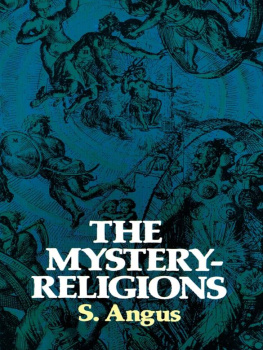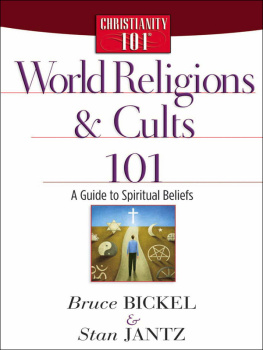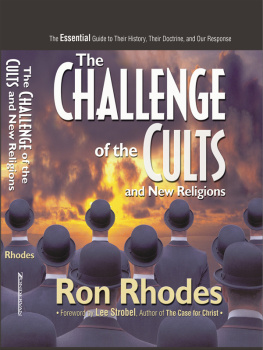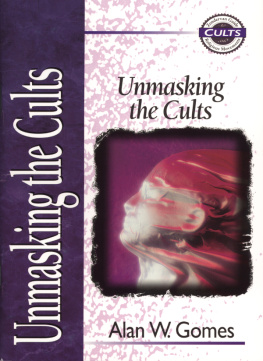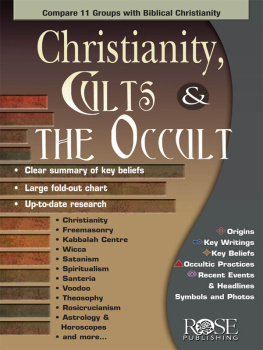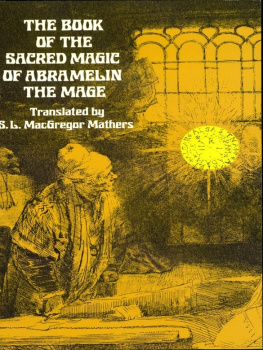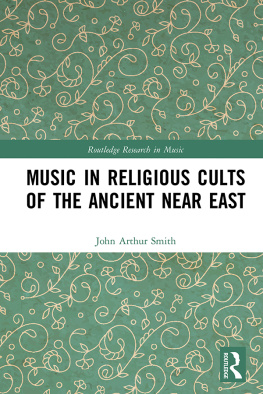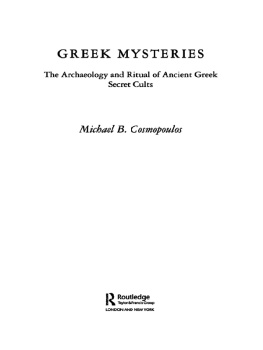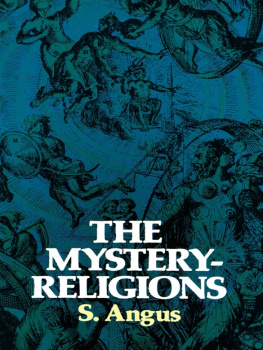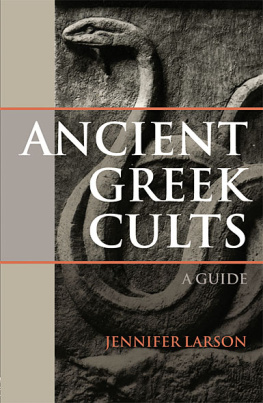S. Angus - The Mystery-Religions
Here you can read online S. Angus - The Mystery-Religions full text of the book (entire story) in english for free. Download pdf and epub, get meaning, cover and reviews about this ebook. year: 2012, publisher: Dover Publications, genre: Religion. Description of the work, (preface) as well as reviews are available. Best literature library LitArk.com created for fans of good reading and offers a wide selection of genres:
Romance novel
Science fiction
Adventure
Detective
Science
History
Home and family
Prose
Art
Politics
Computer
Non-fiction
Religion
Business
Children
Humor
Choose a favorite category and find really read worthwhile books. Enjoy immersion in the world of imagination, feel the emotions of the characters or learn something new for yourself, make an fascinating discovery.
The Mystery-Religions: summary, description and annotation
We offer to read an annotation, description, summary or preface (depends on what the author of the book "The Mystery-Religions" wrote himself). If you haven't found the necessary information about the book — write in the comments, we will try to find it.
The Mystery-Religions — read online for free the complete book (whole text) full work
Below is the text of the book, divided by pages. System saving the place of the last page read, allows you to conveniently read the book "The Mystery-Religions" online for free, without having to search again every time where you left off. Put a bookmark, and you can go to the page where you finished reading at any time.
Font size:
Interval:
Bookmark:

This Dover edition, first published in 1975, is an unabridged and unaltered republication of the second (1928) edition of the work originally published by John Murray, in London, in 1925 under the title The Mystery-Religions and Christianity.
9780486143514
Library of Congress Catalog Card Number: 74-12657
Manufactured in the United States by Courier Corporation
23124009
www.doverpublications.com

Plotinus, Enneades, VI. 5, 7.



 .
.
Euripides, Bacchae, 395.
Uno itinere non potest pervenire ad tam grande Secretum.
Q. Aurelius Symmachus, Rel. III (Seecks ed. p. 282).
FOREWORD
FOR over a thousand years the ancient Mediterranean world was familiar with a type of religion known as Mystery-Religions which changed the religious outlook of the Western world, and which are operative in European civilization and in the Christian Church to this day. Dean Inge, e.g. in his Christian Mysticism, p. 354, says that Catholicism owes to the Mysteries the notions of secrecy, of symbolism, of mystical brotherhood, of sacramental grace, and, above all, of the three stages in the spiritual life: ascetic purification, illumination, and 
 as the crown. These Mysteries covered an enormous range, and manifested a great diversity in character and outlook, from Orphism to Gnosticism, from the orgies of the Cabiri to the fervours of the Hermetic contemplative. Some of them, e.g. the Eleusinia, were Greek, but the majority were of Oriental provenance and all were infected by the spirit of the Orient. The most important were the Greek Eleusinia, the cults of the Cappadocian Men, the Phrygian Sabazios and the Great Mother, the Egyptian Isis and Serapis, and the Samothracian Cabiri, the Dea Syria and her satellites, the Persian Mithra. For over eleven centuries Eleusis supported the hope of man till destroyed by the fanatic monks in the train of Alaric in 396. The Orphic gospel was heard in the Mediterranean for at least twelve centuries. For eight centuries Queen Isis and the Lord Serapis swayed their myriads of devotees in the Greek world, and for five centuries in the Roman. The Great Mother was passionately revered for six centuries in Italy. For over half a millennium the approach to religion for thoughtful minds was by the Gnostic path. Such factssince no religion persists by its falsehood, but by its truthentitle the ancient Mysteries to due consideration. As an important background to early Christianity and as the chief medium of sacramentarianism to the West they cannot be neglected; for to fail to recognize the moral and spiritual values of Hellenistic-Oriental paganism is to misunderstand the early Christian centuries and to do injustice to the victory of Christianity. Moreover, much from the Mysteries has persisted in various modern phases of thought and practice.
as the crown. These Mysteries covered an enormous range, and manifested a great diversity in character and outlook, from Orphism to Gnosticism, from the orgies of the Cabiri to the fervours of the Hermetic contemplative. Some of them, e.g. the Eleusinia, were Greek, but the majority were of Oriental provenance and all were infected by the spirit of the Orient. The most important were the Greek Eleusinia, the cults of the Cappadocian Men, the Phrygian Sabazios and the Great Mother, the Egyptian Isis and Serapis, and the Samothracian Cabiri, the Dea Syria and her satellites, the Persian Mithra. For over eleven centuries Eleusis supported the hope of man till destroyed by the fanatic monks in the train of Alaric in 396. The Orphic gospel was heard in the Mediterranean for at least twelve centuries. For eight centuries Queen Isis and the Lord Serapis swayed their myriads of devotees in the Greek world, and for five centuries in the Roman. The Great Mother was passionately revered for six centuries in Italy. For over half a millennium the approach to religion for thoughtful minds was by the Gnostic path. Such factssince no religion persists by its falsehood, but by its truthentitle the ancient Mysteries to due consideration. As an important background to early Christianity and as the chief medium of sacramentarianism to the West they cannot be neglected; for to fail to recognize the moral and spiritual values of Hellenistic-Oriental paganism is to misunderstand the early Christian centuries and to do injustice to the victory of Christianity. Moreover, much from the Mysteries has persisted in various modern phases of thought and practice.
As we attempt to re-live the experiences or to recapture the mentality of the past, to break upon the inexorable silences of perished centuries, to give heed to those who laboriously devoted themselves to the everlasting human problem, and to understand the old emphases which have shifted, our attitude must be that of sympathy as also of appreciation of every effort made by the human spirit toward reality and toward the attainment of
that blessed mood,In which the burthen of the Mystery,
In which the heavy and the weary weight
Of all this unintelligible world
Is lightened.
Every endeavour to secure news from the inner court of things and to bring man into touch with the Eternal is of worth in our human story. Without undue generosity we may have patience with men who set out for a goal which they never reached, realizing that the failures of former generations are as interesting, and often more instructive, than their successes.
In estimating the Mysteries we must not judge them, any more than any other religions, by their lowest forms, but, as Cicero recognized, we must take the example from the highest and judge them rather by their ideals. It is an historic injustice to compare the Bacchi of one religion with the thyrsus-bearers of another. If there is only one River of Truth, into which tributaries from all parts flow, as asserted by the most readable of the Christian Fathers, Clement of Alexandria, who lived in the heyday of the Mysteries, we need not disdain the tributaries. The pagan misunderstandings of primitive Christianity are a warning to the student of religious history. Celsus in all good faith viewed his equally honest opponents religion as gross superstition. The holiest riteAgapeof the first believers was travestied as the occasion of immoralities and Thyestean banquets. The absence of image, sacrifice, and temple seemed to lead to the obvious conclusion that Christians were Atheists.
This disability of the adherent of one religion to understand the adherent of another religion is an unlovely fact in the history of religions and by no means antiquated to-day. Men are separated in their religious sympathies by culture, tradition, era, individual and group experiences. The saintly John Wesley saw in Catherine of Genoa a fool of a saint. A late Dean of Westminster, Dr. Farrar, spoke disparagingly of one, whose death-scene in the interests of moral integrity has appealed to the imagination of twenty-three centuries, as the ugly Greek. A cultured Greek like Herodotus was astonished at the aniconic worship of Persia, and the Romans were bewildered to find no image in the temple of Jerusalem.
In the study of the Mysteries we shall see truth and error side by side, the spirituality of the true epoptes and the magic sacramentarianism of the literalist, the inability to distinguish between the cult act and the religious experience. We shall detect the conjunction of faith and credulity, the degeneration of mysticism into occultism, the revivalist phenomena and mass-psychology, and those pathological conditions of illusion, suggestion, and hypnotic hallucination and emotional excitations which too easily issue in moral aberrations. We shall meet the extravagances and extremes which are the concomitants of every great movement, and which in healthy creative periods are kept in restraint, but waiting to force their way to the front with any weakening of the originating conception or native power.
On the other hand, the Mysteries stood for much of permanent value. Above all they emphasized the perfect humanity and passion of the Deity, and suggested a fellowship of suffering as the pre-condition to participation in the divine victory. This Sympathia was more akin to the mediaeval desire to share the sufferings of the Saviour in extreme forms, as in the marks of the Cross or the wounds of Christ. They offered a gospel of salvation by means of union with Saviour-Gods, and of a Hereafter of blessedness for initiates. As trans-social organizations they furthered personal religion. In their general trend they made for monotheism. In their emotional triumphs they satisfied the need of exaltation and escape. By their cosmic outlook they made men comfortable in an uncomfortable Universe. Never was there an age which heard so distinctly and responded so willingly to the call of the Cosmos to its inhabitants. The unity of all Life, the mysterious harmony of the least and nearest with the greatest and most remote, the conviction that the life of the Universe pulsated in all its parts, were as familiar to that ancient cosmic consciousness as to modern biology and psychology. By the articulation of their symbolism they adumbrated that indefinable aspect of mans religion of which Otto has so excellently taken account in his Das Heilige, as they also witnessed, if feebly, with Bonaventura: If you would know how these things come to pass, ask it of desire, not intellect; of the ardours of prayer, not of the teaching of the schools.
Next pageFont size:
Interval:
Bookmark:
Similar books «The Mystery-Religions»
Look at similar books to The Mystery-Religions. We have selected literature similar in name and meaning in the hope of providing readers with more options to find new, interesting, not yet read works.
Discussion, reviews of the book The Mystery-Religions and just readers' own opinions. Leave your comments, write what you think about the work, its meaning or the main characters. Specify what exactly you liked and what you didn't like, and why you think so.

